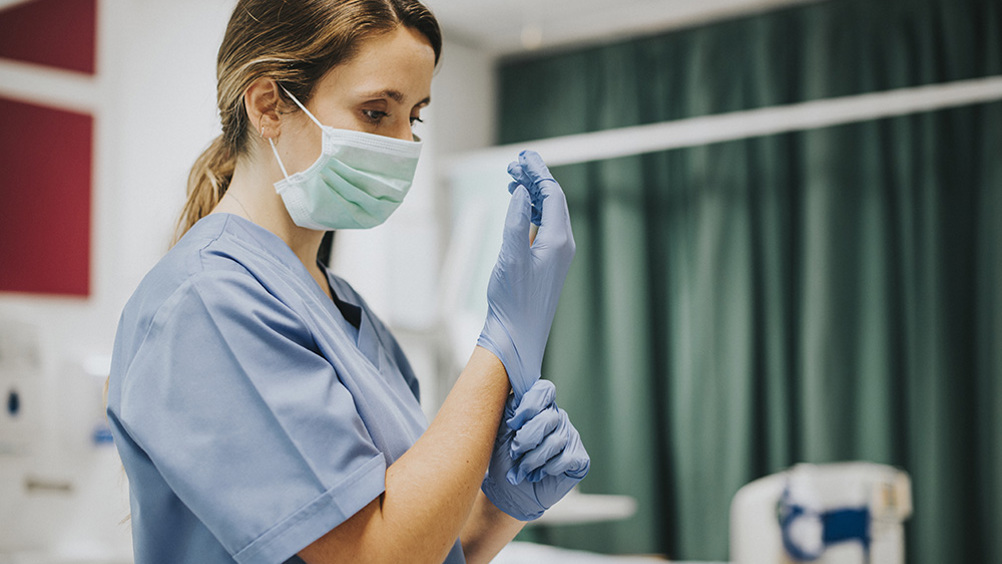Nursing provides the opportunity to work in many different clinic settings and I have learnt that, in every role you hold, you can make a positive difference to patient care.
Where did my journey start?
Working in various roles in my career has led me to develop an enthusiasm for safe and effective infection prevention.
In late 2019, as part of my work as a senior nurse, I became the Infection Prevention and Control (IPC) Lead at St Luke's Hospice. The hospice provides palliative care in the two London boroughs of Brent and Harrow. Palliative care services are provided in a hospice and in the community, which has given me an insight into the complexities of community health and social care and the challenges of providing IPC in people's homes, care homes and other accommodation provisions. Perhaps IPC is thought of as predominantly applying to hospital settings, but IPC innovation and excellence is integral to patient care in the wider health and care landscape in the community.
With the support of the Director of Patient Services, I set about transforming the role of IPC lead. I wanted to engage staff to work together to ensure IPC practice was at the centre of safe and personalised patient care. I undertook a training course to become an infection control practitioner to update my clinical knowledge. I then set up an IPC steering group to oversee audit, surveillance, monitoring and reporting and to communicate and implement good practice internally.
With the start of the COVID-19 pandemic in early 2020, I needed to be focused on safe practice and to lead the hospice through multiple challenges, such as COVID testing, use of personal protective equipment, safe practice and compliance, multiple guideline changes, vaccination updates and management of the inpatient unit during COVID-19 outbreaks. I needed to keep up to date with national and local infection prevention developments and to act as an expert resource for the wider organisation. This was made especially difficult because there were no specific guidelines for hospices in the early stages of the pandemic and the organisation was more aligned to care home guidance then hospital guidelines. Throughout the pandemic it was important to support all staff, patients and families experiencing change and uncertainty.
What have I learnt?
IPC is integral to the provision of safe and compassionate end-of-life care for all patients and families. Providing personalised IPC enables families to say goodbye to their loved ones with privacy, dignity and safety. Farewell visits should be facilitated with safety for all and I worked with my colleagues to support meaningful family visits wherever possible.
Safe infection control requires leadership, action and compassion. During the pandemic I reviewed and changed the hospice internal housekeeping service provision, from a focus on morning cleaning, laundry and deep cleaning to an all-day provision to support medical and nursing staff to admit and discharge patients throughout the day and at weekends. This in turn supported the multidisciplinary teams working in hospitals, care homes and community settings to admit patients at ‘out-of-hours’ times
I realised that an effective IPC role model is integral to the service provision required for patients at the end of life. I helped to provide clean laundry as needed and could be found on the inpatient unit changing disposable antimicrobial curtains or discussing areas of concern with staff, patients and families. I was often in the laundry room helping with washing and drying to ensure standards of cleaning and disinfection were maintained and that there was sufficient linen for all our patients.
I have empowered others to be responsible for making improvements in practice. I worked with nursing colleagues to embed audit and inspection. I drew on my experience as a nurse teacher to teach the importance of surveillance, principles of IPC and the importance of sharing knowledge and skills. At IPC steering group meetings, I highlighted the benefit of different viewpoints, working together to improve the quality of our IPC provision.
My role involved addressing poor practice and finding solutions to problems. Confidentiality and understanding of individual feelings towards restriction measures, vaccination, lateral flow testing and isolation measures were essential to ensure patients, families, staff and volunteers were all supported and safe. I set up clinical infection bulletins to disseminate information in an understandable format to all staff and volunteers.
Effective IPC had a crucial role in enabling the delivery of safe care during the pandemic. I am proud that I have had a committed and responsive approach to the changing priorities within IPC practice, which aligns with the values of nursing. My IPC work was recognised by my colleagues and I was nominated to be Infection Prevention Nurse of the Year in the BJN Awards. Winning the award confirmed to me that nurses are essential to the provision of person-centered compassionate infection prevention.
Impact of the award
To build on the success of my award I wanted to develop further in IPC and in June this year I became a Senior Infection Control Nurse for the Central London Community Healthcare NHS Trust. I wanted to join a forward-thinking trust that provides IPC across a large array of community services in London and Hertfordshire for people at all stages in life. This wider scope means my learning is expanding but the focus remains on the importance of person-centred IPC.
Future challenges
Effective IPC provides safer care as we learn to live against the backdrop of the impact of the COVID-19 pandemic. We have had the opportunity to innovate services through hybrid working but the priority must be for the patient experience to remain at the centre of safe, personalised care.


